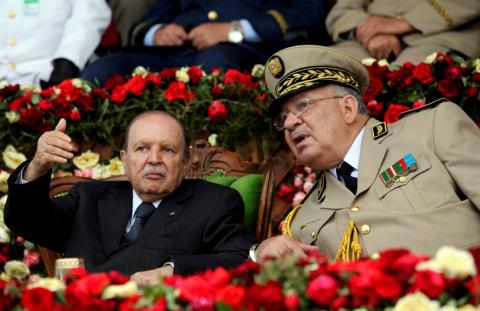Advertisement
Algeria's president might resign this week -private TV channels
ALGIERS (Reuters) - Algerian President Abdelaziz Bouteflika might resign this week, the private Ennahar and El Bilad TV channels said on Sunday, after mass protests and pressure from the army demanding he end his 20-year rule.
The reports come after the army chief of staff, Lieutenant General Ahmed Gaed Salah, renewed a call on Saturday for the Constitutional Council to declare the ailing 82-year-old Bouteflika unfit to rule. [nL8N21H0N8]
Seeking to defuse the demonstrations, Bouteflika said on March 11 he was dropping plans for a fifth term. But he stopped short of stepping down immediately, to wait for a national conference on political change.
That further enraged protesters, prompting Salah to step in by proposing last week to ask the constitutional council to see whether he is still fit for office.
Bouteflika, who has rarely been in public since suffering a stroke in 2013, might announce his resignation on Tuesday, Ennahar TV said, citing political sources. El Bilad TV, quoting unnamed sources, said he would quit this week.
State media did not report similar reports, and there was no immediate comment from the presidency.
Ennahar said Bouteflika was preparing his resignation in accordance with article 102 of the constitution, which allows him to quit or face the verdict of the constitutional council whether he is still fit for office.
Late on Sunday, hundreds took to the streets in the capital, Algiers, to demand Bouteflika go, according to residents and pictures posted on social media.
The reports came hours after Bouteflika named a caretaker Cabinet. Political sources said that might be a signal that Bouteflika could resign, as a caretaker president cannot name Cabinets.
Incumbent Prime Minister Noureddine Bedoui will head the administration, state news agency APS said, listing 27 ministers.
Central bank Governor Mohamed Loukal was named as finance minister, while the former head of the state power and gas utility Mohamed Arkab will be energy minister, APS said.
Sabri Boukadoum, a former envoy to the United Nations, becomes foreign minister and replaces Ramtane Lamamra, who spent less than a month in the role.
Salah kept his position as deputy defence minister in the reshuffle, according to state media. Bouteflika kept his title as defence minister. [nL8N21I0XK]
Bouteflika also named the communications minister, Hassane Rabhi, as government spokesman, a rarely filled post in what critics say has been a secretive administration.
CHANGE?
Demonstrators have rejected military intervention in civilian matters and want to dismantle the entire ruling elite, which includes veterans from the war of independence against France, army officers, the ruling party and business tycoons.
Tens of thousands have taken to the streets of Algiers for more than a month, complaining of corruption, nepotism and economic mismanagement they say has tarnished Bouteflika's rule.
But two opposition leaders have supported the army initiative.
"The merit of this approach is that it responds to a pressing popular demand," Ali Benflis, a former head of the ruling FLN party, said in a party statement. "We are facing a political, constitutional and institutional crisis."
Abderazak Makri, head of an Islamist party, said he was against anything that threatened the stability and unity of the country or undermined the military.
Several close allies, including some members of the ruling FLN and union leaders, have abandoned Bouteflika.
The secretary-general of the United Nations said on Sunday he welcomed efforts towards a peaceful and democratic transition in Algeria.
Addressing an Arab League summit in Tunis, Antonio Guterres said any steps should be made in a way "that addresses the concerns of the Algerian people in a timely way".
(Reporting by Lamine Chikhi and Hamid Ould Ahmed; additional reporting by Ali Abdelaty in Cairo; Writing by Michael Georgy and Ulf Laessing; Editing by Edmund Blair, Daniel Wallis and Peter Cooney)



















Add new comment